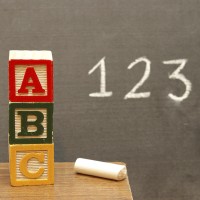Pre-School Curriculum

Preschool, which may also be referred to as nursery school, daycare or kindergarten, is a type of educational establishment for very young children. Known as early childhood education, preschool is for children below the age of compulsory attendance at a primary school establishment. It is often the first educational establishment a child will attend. In the United States, preschools may be run by private organizations, businesses, and state or municipal governments. They are rarely subsidized, so the quality of education depends on the means available from the student’s family. In a preschool classroom, student-to-teacher ratios are usually lower than other age groups.
Who is it for?
Preschool is for children between the ages of three and five. Depending on the circumstances, children may attend preschool up until the age of seven. The concept of having children attend preschool is based on research which suggests the brain is at its most absorbent during the years immediately following birth. During this time, the brain is also in a rapid phase of development. Preschool helps to support and encourage that development through activities. Preschools also aim to introduce young learners to school structure before they attend primary school.

Educational Focus
Preschools in the United States focus on promoting individuality among students. Curriculum may vary according to the age of the students. The preschool environment is usually far less structured than primary school; while approaches differ, students may be given the choice to engage in a number of different activities at the preschool center. These activities may include puzzles and games, drawing or painting, playing with toys, playing imaginative games, or listening to the teacher read a story. Preschools encourage and foster children’s play. The choice of activities may vary from session to session, but the focus is on helping students to develop mathematical awareness, physical awareness, communication, world awareness, creativity, self-help skills, social skills, literacy skills, and problem solving skills.
Types of Schools
There are a number of different approaches towards preschool education. Some of the most popular methods in the United States include:
- Montessori: Developed by Italian educator Maria Montessori, this approach emphasizes independence, limited freedoms, and respect for the child’s natural course of social, psychological, and physical development.
- Waldorf: Waldorf education comprises a humanistic approach, based on the concepts outlined by Rudolf Steiner, an Austrian philosopher. This approach addresses three comprehensive stages of child development.
- The Head Start Program: Head Start is a program run by the United States Department of Human Services. It is a comprehensive program for preschool-aged students that includes nutrition, health, and relationships.
Benefits
Preschools have been shown to have a mostly positive, long-term effect on student’s lives, especially for disadvantaged students. The majority of children attend at least one year of preschool. In studies conducted by Stanford University and UC Berkeley, students who attended preschool were found to exhibit advantages in math, vocabulary development, and reading. Socialization is an area of dispute; while most experts agree that it is good for children to socialize before they enter primary school, research has indicated that preschool may have a negative effect on a child’s social skills. However, most kindergarten teachers agree that students are easier to manage when they have attended preschool.
